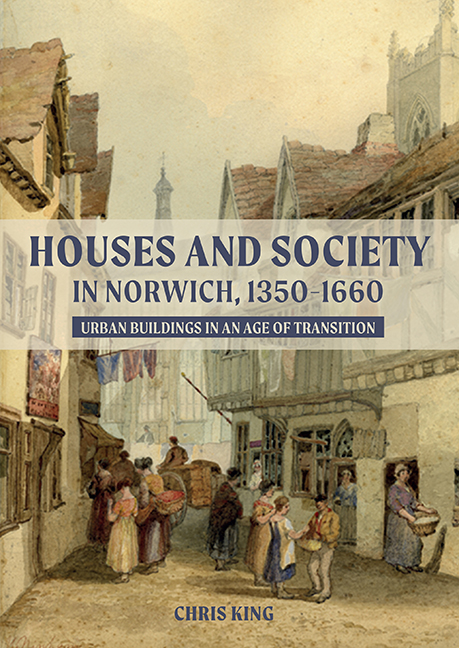Book contents
- Frontmatter
- Dedication
- Contents
- List of plates and figures
- List of tables
- Acknowledgements
- List of Abbreviations
- 1 Urban rebuildings, urban transitions
- 2 Norwich, 1350–1660: continuity and change in an English provincial city
- 3 Medieval merchants’ houses, c.1350–1540
- 4 Early modern merchants’ houses, c.1540–1660
- 5 The urban elite: domestic space, social identity and civic authority
- 6 Medieval houses and the urban ‘great rebuilding’
- 7 Houses of the ‘middling sort’: buildings and the use of space
- 8 Housing the urban poor and immigrant communities
- Conclusions
- Glossary
- Bibliography
- Index
- Plate Section
5 - The urban elite: domestic space, social identity and civic authority
Published online by Cambridge University Press: 23 October 2020
- Frontmatter
- Dedication
- Contents
- List of plates and figures
- List of tables
- Acknowledgements
- List of Abbreviations
- 1 Urban rebuildings, urban transitions
- 2 Norwich, 1350–1660: continuity and change in an English provincial city
- 3 Medieval merchants’ houses, c.1350–1540
- 4 Early modern merchants’ houses, c.1540–1660
- 5 The urban elite: domestic space, social identity and civic authority
- 6 Medieval houses and the urban ‘great rebuilding’
- 7 Houses of the ‘middling sort’: buildings and the use of space
- 8 Housing the urban poor and immigrant communities
- Conclusions
- Glossary
- Bibliography
- Index
- Plate Section
Summary
THE aim of this chapter is to examine the evidence for domestic architecture and modes of life in the wealthy merchant households of late medieval and early modern Norwich in a broader context, both material and cultural. It explores the changing form of the wider urban landscape and the shifting relationship between public and domestic contexts in elite urban culture, seeking to understand the use and meaning of domestic space and how these were bound up with the wider social and cultural transformations of urban society in this period. In doing so, it revisits the central theoretical and historical agendas outlined in Chapters 1 and 2 to examine the ways in which space and material culture were active in the constitution and negotiation of social identities and relationships in the city.
The changing architectural forms of the houses of the civic elite have been extensively described in Chapters 4 and 5. This chapter extends this discussion to focus on the role of urban space and material culture in the maintenance of political authority within the city. The domestic context was a vital locale where elite families expressed a sense of shared cultural identity, and sociability in both public and private spheres was central to maintaining social networks and negotiating political conflicts. The changing form of elite residences in the early modern period was thereby bound up with the dramatic transformation in the role and meaning of the wider urban landscape in the post-Reformation city.
Throughout the late medieval period the growing political and economic power of the city of Norwich was marked by a concern to define and extend the independence of ‘the urban community’, as represented by the adult males who held the franchise. Inseparable from this process was the growing dominance of a small and integrated political elite who shaped the broader rhetoric of urban commensality to reinforce their authority (Rigby 1988; 1995, 160–77; Swanson 1999, 89–96). The development and character of the governing elite was outlined in Chapter 2: in the fourteenth century the city was ruled by four bailiffs, aided by a council of 24; after the charter of incorporation of 1404 the governing structure of mayor, aldermen and common council was established, with further legislation to define their authority and responsibilities in 1415 and 1424 (Campbell 1975, 12, 15).
- Type
- Chapter
- Information
- Houses and Society in Norwich, 1350–1660Urban Buildings in an Age of Transition, pp. 145 - 176Publisher: Boydell & BrewerPrint publication year: 2020



